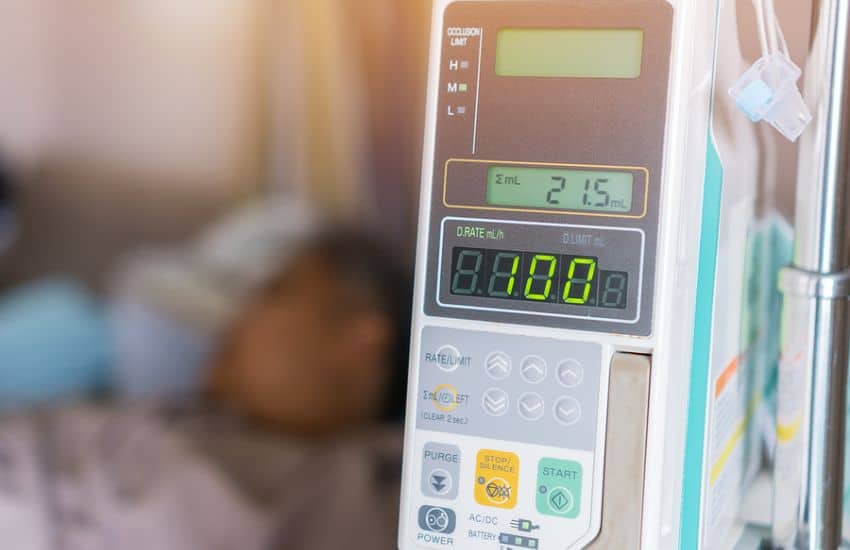Like any piece of medical equipment, infusion pumps require regular inspection and servicing to keep them in peak condition. Infusion pump maintenance can take a lot of time, which is why many Las Vegas area facilities outsource the task to our certified biomedical technicians at Gumbo Medical, LLC.
Be on the lookout for these six signs that it’s time to replace or repair your infusion pumps.
- Signs Of Burning, Fire, Or Shocks
- Damage To Components
- Battery Problems
- Software Issues
- Alarm Failures
- Problems With the User Interface
1. Watch For Signs Of Burning, Fire, Or Shocks
Like any electrical device, infusion pumps can burn or catch fire in rare instances. Obviously, you know to stop using any electrical equipment when you see sparks or flames. You should also discontinue the use of any device that emits a burning or other abnormal odor or feels abnormally hot to the touch.
Also, if you see sparks or receive any shock when plugging in or unplugging a device, stop using it immediately and contact the manufacturer or your service contractor.
2. Inspect Your Pumps For Component Damage
A damaged infusion pump can under- or over-infuse the patient. Some signs of damage to look for include cracks on the plastic casing, broken or cracked keys or LED screen, tubing misalignment, cracked door hinges, worn electrical wiring, etc.
3. Infusion Device Battery Problems To Look Out For
No battery is guaranteed to last forever, whether it’s in a flashlight, a child’s toy, or an essential piece of medical equipment like an insulin pump or other infusion device. Over time, a battery’s ability to hold a charge diminishes, especially if it is totally depleted before being recharged.
Keeping batteries charged, replacing old batteries before they die, and inspecting the batteries for signs of damage/leakage are all steps you can take towards extending the life of your device.
4. Be On The Lookout For Infusion Pump Software Issues
Today’s infusion pumps generally rely on software to control the user interface, the pumping mechanism, and behind-the-scenes safety functions. In many cases, the software is smart enough to present an unmistakable error message informing you that the device is malfunctioning.
The FDA has reported instances of “key bounce” issues with some pumps. In this type of situation, the pump may incorrectly interpret the keystrokes entered as multiple keystrokes, such as the rate of 10 mL/hour being registered as 100 mL/hour.
If you experience key bounce issues, then you should schedule medical device maintenance ASAP.
5. Infusion Pump Alarm Errors To Watch Out For
If an infusion pump fails to issue an audible alarm when a critical problem such as occlusion is present, it needs to be taken out of service immediately. The same is true in the case of false alarms, such as an occlusion alarm generated when there is no occlusion.
6. Beware Of Infusion Pump User Interface Issues
The purpose of any user interface (UI) should be to simplify usage and reduce human operating errors. In the case of insulin and infusion pumps, the UI isn’t just software-based; for instance, external labels or instructions printed directly on the device need to be easy to read and understand.
Even a brand-new unit may have a poorly designed user interface, causing human operator error. It’s best to pay attention to the overall design when choosing new or refurbished pumps, and service or replace units where the labels or instructions may have worn or fallen off.
Is It Time To Replace Your Infusion Units?
Now that you know the signs of damage to look for, you might still be wondering how often you should replace your infusion pump. The answer varies. Many brands can last for up to ten years, so long as they are serviced regularly by a reputable provider. If you do think it’s time for an upgrade, consider sourcing refurbished units to save money.
Infusion Pump Sales & Maintenance
At Gumbo Medical LLC, hospital equipment refurbishment is our specialty. This means we don’t just have used infusion pumps and other medical devices for sale — we also offer maintenance plans to keep your equipment working for as long as possible.
Whether you live near our Las Vegas, NV facility or need to have equipment shipped elsewhere in the U.S. or abroad, you can trust that all of our refurbished hospital equipment, including insulin and infusion pumps, will look and work just like new.
Call today for more information and to place your order.

